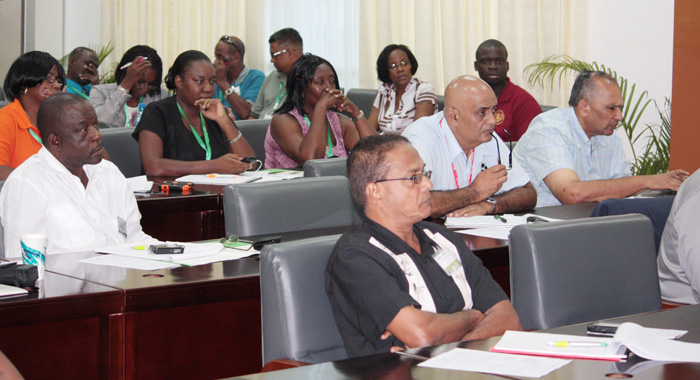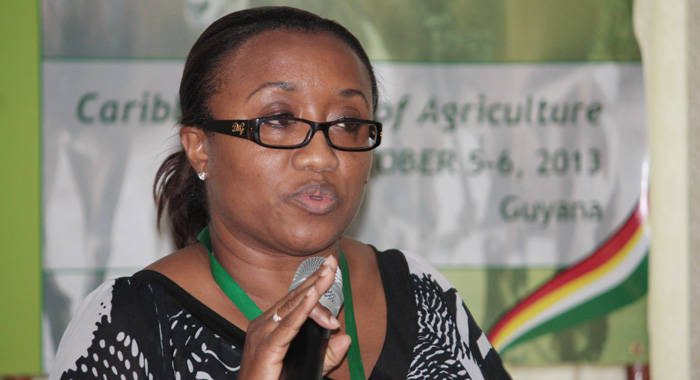GEORGETOWN, Guyana — A Vincentian veterinarian who heads the country’s Sheep and Goat Society has shared with her regional colleagues some of successes and challenges of producing small ruminants in St. Vincent and the Grenadines (SVG).
We are quite proactive and quite active,” Dr. Colleen Phillips told a Caribbean Week of Agriculture workshop on imperative for the small ruminant industry in the Caribbean on Sunday.
She said that over the last three years, her group has had a lot of activities regarding housing and waste management in the small ruminants sector.
She said that 31 small farmers meet once a month and discuss new topics relating to the rearing of sheep and goat.
“And I will tell you the farmers are hungry for information about how to go about producing a proper small ruminant animal,” she said.
Phillips said that her group has a breeding programme, which includes a farmer who has 121 heads of sheep and goat.

On average, farmers have about 75 animals, she said.
However, for breeding stock, farmers are encouraged to stick to 15 breeding ewes because of land space, she said, noting the mountainous nature of SVG.
Phillips said that because of the problems with predial larceny and stray dogs, farmers try to keep their flock close to home.
She said that one member of her group lost 38 animals in one night in a dog attack, and 43 of another farmer’s 45 animals were stolen in one night.
“It’s really, really critical,” Phillips said.
“And while the farmers are very able and enthusiastic, they often become very discouraged when they are attacked that way and it is really a constant battle to try to motivate and re-energise after such a loss,” she further said.
She said that predial larceny and dog attacks are particularly devastating to the sector because the small ruminants are often the farmers’ only source of income.
“They do nothing but that,” Phillips said.
She said that the group has piloted a feeding lot programme that includes two farmers, one of whom raised a 7-month-old ram that weighed 100 pounds.
“On average, that is the sort of weight we were
getting with just feed — legumes and grass,” she said, adding, “We know that is the way we can perform and we are now trying to get that programme spread across the entire farming community with regard to sheep and goat.”
She said a cluster programme has also been introduced and groups of farmers within communities are trained with a view to improving capacity building.
Phillips said, that at the minimum, farmers are trained in proper animal husbandry as it relates to small ruminants.
She further said that 84 persons meet every week and learn how to produce sheep and goat, with emphasis on proper nutrition, proper animal husbandry, and proper breeding.
“And it is really an exciting time and farmers are asking if we can prolong the programme. So it’s exciting and things are happening,” she said.







each other to protect and promote the knowledge.
Id even go as far as to say there can be a program to give well deserving children an animal to rear. It can be a school program where the knowledge and interest can be passed on to other school children. This thing has legs and can go a far way in revitalizing the agricultural industry back in SVG.
The problems Dr. Colleen Phillips mentioned are those I have been hearing every time I visit SVG. I have written and spoken about it and came up with several ways to handle the situation. The feedback I get was always the same, We are doing that, but people continued losing animals.
Here again are some solutions I spoke and wrote about, others can add or even rewrite mine:
1. All meat sold must have a trail to determine who owns the animal before it was killed, who purchased the animal from the owner and that a legitimate butcher killed the animal. Each step must have document (in the form of a receipt) to prove everything is in order.
2. Animals can have the owner brand on the animal and the brand must be registered with the police, or ministry of agriculture. If an animal is found in the hands of anyone and the brand does not belong to that person, then there can be an investigation started (unless the proper documents are available to prove the animal was sold by the owner of the brand). In very case there must be receipts to ensure integrity and accountability.
3. Farmers should use cameras to keep their animals from being stolen. There are wireless systems that will enable people to see what taking place in any location, even though they are miles away. Many people use this system to protect their property and keep an eye on their children when they are at work.
It is much better to keep your animals safe than being sorry when/if they are stolen. I believe NDF and the banks can play a positive role in helping these folks started with this project.
Good work Dr. Colleen Phillips, you are doing a great service to the people and the island on SVG.
Good luck!
The first part of my document is missing. I neglected to copy the entire document from WORD. WORD has a habit of changing words and other stuff when you run a document through the program.
Anyway, can someone tell me where I can purchase some of the animals mentioned in the document?